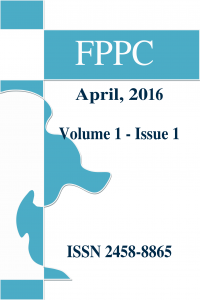Attitude of Term II and III Students in Canakkale Onsekiz Mart University School of Medicine Towards Problem Based Learning
Abstract
Introduction: Problem based learning (PBL) presents complicated real life problems and provides students to use analysing and
synthesis abilities while reaching a solution. Students decide on solution pathways and produce concept maps on their own. Problem
based learning represents experience-based learning which requires active participation for characterization and solution of the problem.
In this study we aimed to evaluate the attitude of medical students to PBL sessions.
Methods: In this descriptive designed study, attitude scale towards PBL applied to the Canakkale Onsekiz Mart University School of
Medicine term II and III students just after PBL sessions.
Results: One hundred twenty five students agreed to participate the study. Reliability co-efficient (co-efficient alfa) of PBL attitude
scale (test with 38 clauses) was 0.777. Group work sub-group mean score of term III students was significantly higher than term II
students (p=0.050). Lesson subject sub-group mean score was significantly higher in term II students (p=0.036). There were no
significant difference between other sup-groups (p>0.05).
Conclusion: Students were found to be positive attitude to PBL sessions. Term III students adopted more than term II students.
Experiencing more PBL sessions can be important for adopting group work. It would be a mistake to talk about positive attitude towards
PBL because of the limited number of PBL sessions in this school of medicine.
Keywords
References
- Loyens SMM, Magda J, Rikers RMJP. Self-directed learning in problem-based learning and its relationships with self-regulated learning. Educational Psychology Review 2008:20(4):411-27.
- Savery JR, Duffy TM. Problem based learning: An instructional model and its constructivist framework. CRLT Tecnical Report No. 16-01, Bloomington, Indiana University. 2001
- Spencer JA, Jordan RK. Learner centred approaches in medical education. BMJ. 1999;318: 1280–1283.
- Özvarış ŞB, Demirel Ö. Öğrenen merkezli tıp eğitimi. Ankara: Türk Tabipleri Birliği Merkez Konseyi, 2002.
- Torp L, Sage S. Problems as possibilities: Problem-based learning for K-12 education. USA: Association for Supervision and Curriculum Development, 1998.
- Kemahlı S, Alper A. Probleme dayalı öğrenmeye yönelik tutum ölçeği. Eğitim Bilimleri ve Uygulama 2006;5(10):191-206.
- Van den Hurk MM, Dolmans DHJM, Wolfhagen IHAP et al. Impact of individual study on tutorial group discussion. Teaching and Learning in Medicine; 1999;11(4):196-201.
- Schmidt HG. Educational aspects of problem-based learning. Jochems WMG., ed. Aktiverend Onderwijs. Delft: Delftse Universitaire Pers.1990: 1-16.
- Schmidt HG. Foundations of problem-based learning: some explanatory notes. Medical Education 1993;27(5):422-32.
- Demirören M, Turan S, Öztuna D. Medical students' self-efficacy in problem-based learning and its relationship with self-regulated learning. Med Educ Online. 2016:21;30049.
Çanakkale Onsekiz Mart Üniversitesi Tıp Fakültesi Dönem II ve III Öğrencilerinin Probleme Dayalı Öğrenime Karşı Tutumları
Abstract
Giriş: Probleme dayalı öğrenme (PDÖ), karmaşık ve gerçek hayat problemlerini ortaya koyar ve öğrencinin çözüme giderken hem
analiz, hem de sentez yeteneğini kullanmasını sağlar. Çözüme giderken belirlenen yolları öğrenci kendisi belirler ve kavram haritaları
çıkararak öğrenmeyi sağlar. Probleme dayalı öğrenme problemi tanıma ve çözüm için bireylerin hem zihin hem de beceri yönünden
aktif katılımlarını gerektiren, deneyime dayanan öğrenmeyi temsil eder. Bu çalışmada tıp fakültesinde uygulanan PDÖ oturumlarına
karşı öğrencilerin tutumlarını değerlendirmek amaçlanmıştır.
Yöntem: Tanımlayıcı desendeki çalışmada Çanakkale Onsekiz Mart Üniversitesi Tıp Fakültesi Dönem II ve Dönem III öğrencilerine
PDÖ oturumlarından hemen sonra probleme dayalı öğrenime karşı tutum ölçeği uygulanmıştır.
Bulgular: Çalışmaya 125 öğrenci katıldı. Probleme Dayalı Öğrenme Tutum Ölçeği (38 maddelik test) güvenirlik katsayısı (co-efficient
alfa)=0,777 idi. PDÖ tutum ölçeğinde Dönem III öğrencilerinin grup çalışması alt grup puan ortalaması Dönem II öğrencilerinden
anlamlı daha yüksekti (p=0,050). Ders alt grup puan ortalaması Dönem II öğrencilerinde anlamlı daha yüksekti (p=0,036). Diğer alt
grup puanları arasında anlamlı farklılık yoktu (p>0,05).
Sonuç: Öğrenciler PDÖ oturumlarına yönelik eğitim programlarına karşı olumlu tutumlar içinde oldukları gözlenmektedir. Dönem III
öğrencileri grup çalışmasını dönem II öğrencilerine göre daha çok benimsemişlerdir. Grup çalışmasının benimsenmesinde daha fazla
sayıda PDÖ oturum deneyimi yaşamak önemli olabilir. Bu çalışmanın yapıldığı tıp fakültesinde sınırlı sayıda PDÖ oturumları
düzenlendiğinden, tümüyle PDÖ ye karşı tutumlarının olumlu olduğundan bahsetmek hatalı olacaktır.
Keywords
References
- Loyens SMM, Magda J, Rikers RMJP. Self-directed learning in problem-based learning and its relationships with self-regulated learning. Educational Psychology Review 2008:20(4):411-27.
- Savery JR, Duffy TM. Problem based learning: An instructional model and its constructivist framework. CRLT Tecnical Report No. 16-01, Bloomington, Indiana University. 2001
- Spencer JA, Jordan RK. Learner centred approaches in medical education. BMJ. 1999;318: 1280–1283.
- Özvarış ŞB, Demirel Ö. Öğrenen merkezli tıp eğitimi. Ankara: Türk Tabipleri Birliği Merkez Konseyi, 2002.
- Torp L, Sage S. Problems as possibilities: Problem-based learning for K-12 education. USA: Association for Supervision and Curriculum Development, 1998.
- Kemahlı S, Alper A. Probleme dayalı öğrenmeye yönelik tutum ölçeği. Eğitim Bilimleri ve Uygulama 2006;5(10):191-206.
- Van den Hurk MM, Dolmans DHJM, Wolfhagen IHAP et al. Impact of individual study on tutorial group discussion. Teaching and Learning in Medicine; 1999;11(4):196-201.
- Schmidt HG. Educational aspects of problem-based learning. Jochems WMG., ed. Aktiverend Onderwijs. Delft: Delftse Universitaire Pers.1990: 1-16.
- Schmidt HG. Foundations of problem-based learning: some explanatory notes. Medical Education 1993;27(5):422-32.
- Demirören M, Turan S, Öztuna D. Medical students' self-efficacy in problem-based learning and its relationship with self-regulated learning. Med Educ Online. 2016:21;30049.
Details
| Primary Language | English |
|---|---|
| Subjects | Health Care Administration |
| Journal Section | Original Research |
| Authors | |
| Publication Date | February 22, 2016 |
| Submission Date | February 22, 2016 |
| Acceptance Date | April 5, 2016 |
| Published in Issue | Year 2016 Volume: 1 Issue: 1 |

